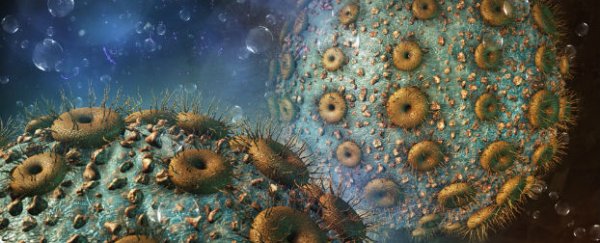A drug that's used to treat alcoholism has been found to activate dormant HIV cells, dragging them out of hiding so they can be destroyed. When given to 30 HIV positive patients in the US and Australia in a three-day trial, the common anti-alcohol drug, disulfiram, appears to 'wake up' HIV cells without causing any harmful side-effects.
Sold commercially as Antabuse, the drug causes people to vomit when they consume alcohol, which makes a pretty strong case to never drink again. But now it seems it can also overcome one of the greatest hurdles to curing HIV/ AIDS: HIV latency.
HIV latency allows the virus to lay dormant and undetected in various hiding places around the body, safe from the effects of current antiretroviral drugs (ART) that can only treat HIV in the bloodstream.
Scientists had already identified a class of drugs called histone deacetylase that can kick dormant HIV into gear, but they inflict too many toxic side effects to be a viable treatment option. That's what makes disulfiram so promising - no harmful side-effects have been detected.
"This trial clearly demonstrates that disulfiram is not toxic and is safe to use, and could quite possibly be the game changer we need," lead researcher, Sharon Lewin from the University of Melbourne in Australia, told Reuters. "The dosage of disulfiram we used provided more of a tickle than a kick to the virus, but this could be enough. Even though the drug was only given for three days, we saw a clear increase in [the] virus in [blood] plasma, which was very encouraging."
Current antiretroviral drugs can keep HIV in the blood in check, but patients have to take them for the rest of their lives in case the dormant virus re-emerges. Disulfiram appears to flush everything out into the open, which is just the first step in the search for a cure.
Once the team confirms that the drug is definitely flushing out the dormant HIV - Andy Coghlan reports for New Scientist that they interpret an increase in HIV gene expression in their study group as a sign that it had been woken up - the next step will be to find a drug that can kill them once they hit the bloodstream. While antiretroviral drugs can stop these cells from multiplying, they can't destroy them.
"This is a very important step as we have demonstrated we can wake up the sleeping virus with a safe medicine that is easily taken orally once a day. Now we need to work out how to get rid of the infected cell. A kick-start to the immune system might help," one of the team, Julian Elliott from the University of Melbourne, said in a press release. "We have an enormous amount still to learn about how to ultimately eradicate this very smart virus."
The study has been published in The Lancet HIV.
